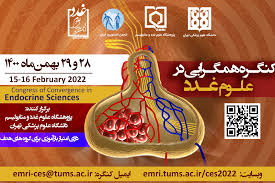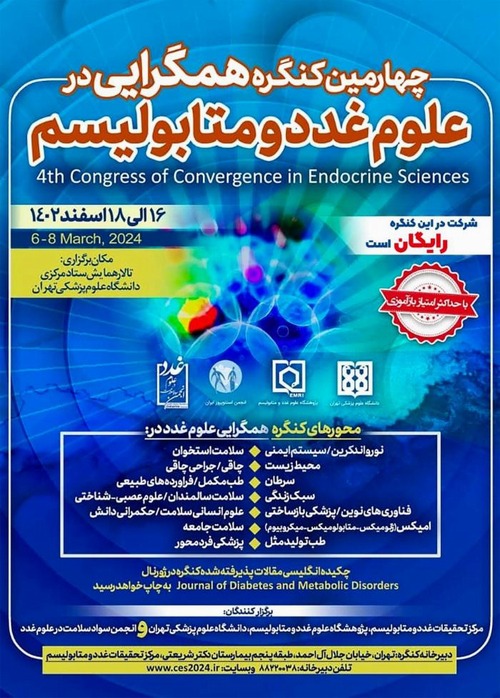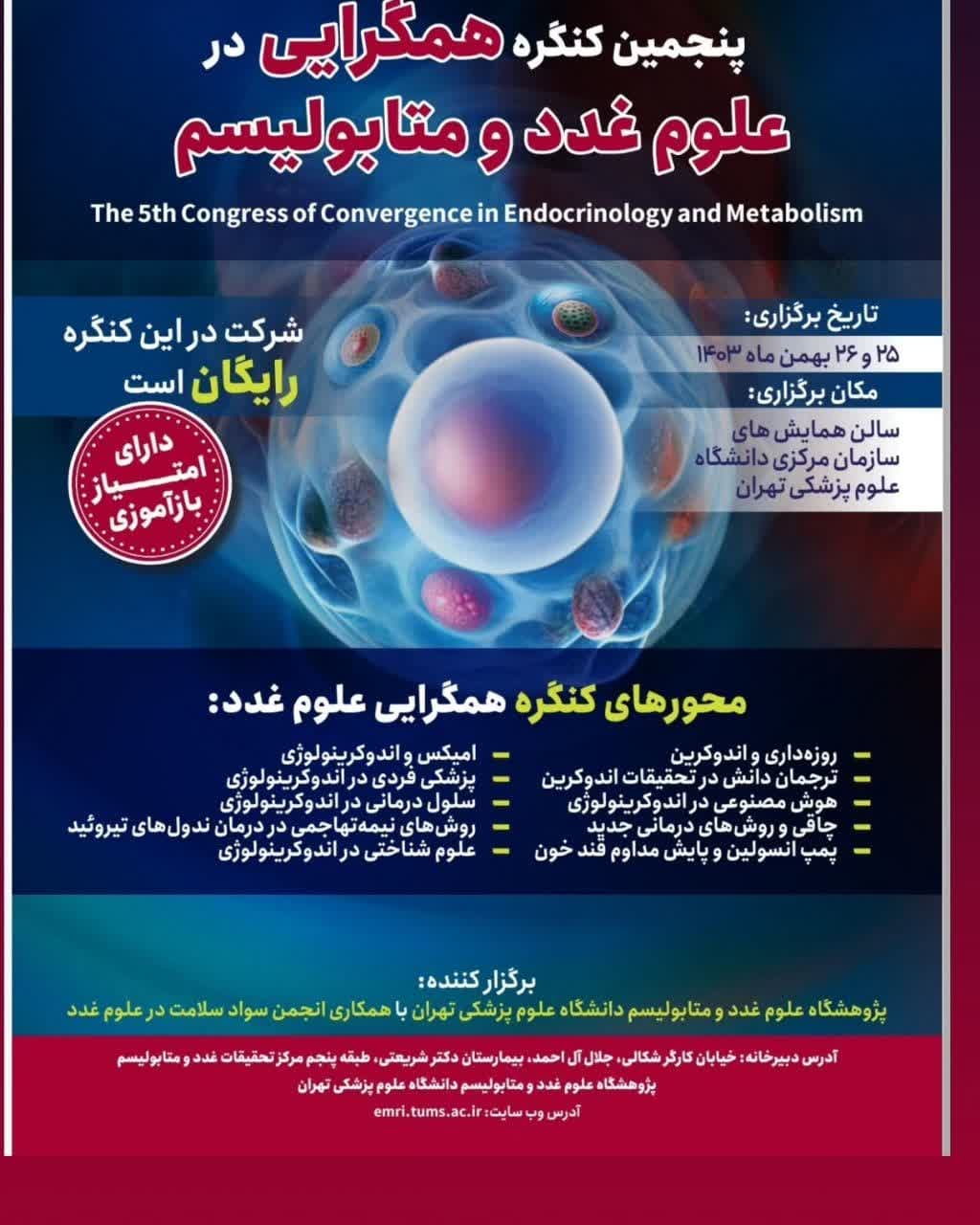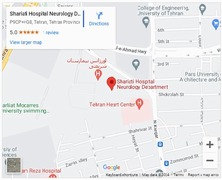- 1404/04/07 Association between serum hemoglobin level and bone mineral density in adults: Iranian multi-center osteoporosis study (IMOS)
- 1404/04/07 Predictors of biochemical and structural response to medical therapy in patients with active acromegaly following surgery: a real-world perspective
- 1404/04/07 Continued rise in the incidence of thyroid cancer in Iran: true increase or overdiagnosis
- 1403/10/20 program 5th Convergence Congress in Endocrinology
- 1403/10/12 The effect of Nurse-led Care implementation on Quality of Care & remove of diabetic foot ulcer and explain patients’ experiences A Mixed Method study
- 1403/10/05 Ovarian volume, not follicle count, is independently associated with androgens in patients with polycystic ovary syndrome
- 1403/10/05 Multicentral health and care assessment of diabetic foot in patients with diabetes

*The 2nd Annual Convergence Congress on Endocrinology Convergence*
The 2nd Annual Convergence Congress on Endocrinology aimed to bring together experts from various scientific fields to address challenges in endocrinology and improve patient care.
The congress highlighted the significance of using data to understand disease patterns and inform healthcare policies.
The STEPS study was mentioned as a valuable tool for gathering epidemiological data.
Iran's progress in scientific research was commended, particularly in the field of endocrinology where the country ranks first in the Middle East.
The congress focused on fostering collaboration among different scientific disciplines to improve the diagnosis, treatment, and prevention of endocrine diseases.
Dr. Baqer Larijani, the head of the Convergence Congress on Endocrinology, stated in the opening ceremony held on Friday, February 18, 2022 that the institute has been striving to conduct research through the convergence of various scientific fields in order to improve diagnosis, control, and patient care.
He considered the targeted gathering of various fields such as personalized medicine, biosensors, microbiome, metabolomics, genomics, cell therapy, regenerative medicine, genetics, and modeling at the Research Institute for Endocrinology and Metabolism as a practical example of this convergence.
He stated that through the efforts of various health sectors in the country and the actions taken at the institute, health information in the country regarding non-communicable diseases and their associated risk factors has been provided, categorized by county, city, and province.
He mentioned that this significantly facilitates the identification of disease trends and the country's health status.
He added that one of the advantages of conducting the STEPS study and collecting and analyzing epidemiological data is that, based on data analysis, we have a good estimate of the prevalence of non-communicable diseases in different regions according to age and gender, which enables health planners and policymakers to plan according to the conditions of each city or province. This has a significant impact on governance planning.
Dr. Larijani described the path of scientific development in the country as the production of systematic knowledge published in peer-reviewed articles.
He added that fortunately, Iran has been successful in producing scientific products and has experienced significant growth in this area, with an increasing trend in recent years.
Referring to the country's acceptable scientific ranking in the world, the head of the Convergence Congress stated that, based on science production indicators, Iran's position is better than most countries in the region, and in the field of endocrinology, we hold the first rank in terms of scientific production in the Middle East.
Emphasizing that we should not fall behind in this scientific race and must always move forward without stopping, he noted that we need to increase our efforts in the field of innovation in the country.
Dr. Larijani added that our country has high potential in terms of innovation indicators, but we must strive to turn these potential abilities into action to achieve a more suitable position among the world's countries.
Dr. Larijani expressed hope that this seminar could be a step forward in this direction and guide our minds towards the convergence of sciences to meet the needs of society.
*Interdisciplinary Approach Key to Preventing Non-Communicable Diseases*
The president of the Iran Academy of Medical Sciences emphasized the importance of interdisciplinary approaches in preventing non-communicable diseases.
Dr. Seyed Alireza Marandi, the president of the Academy of Medical Sciences, in the opening ceremony of Congress of Convergence in the Endocrinology described interdisciplinary collaboration as a relatively new strategy and experience in the field of technology.
He stated that humans, with their great abilities, are constantly seeking new methods and strategies to advance towards innovation.
He identified the primary goal of medical research as ensuring, preserving, and improving the overall health of society and, ultimately, achieving health equity. He further stated that education, research, various types of care, and the provision of health services are all tools to achieve these noble goals.
Dr. Marandi added that interdisciplinary collaboration should encompass science, ethics, and religious teachings. While emphasizing the use of interdisciplinary approaches in treating diseases, he suggested that we should focus more on using these approaches to prevent diseases, especially non-communicable ones.
The president of the Academy of Medical Sciences stressed that prioritizing prevention does not contradict treatment.
He also warned against neglecting the spiritual health of society, as this would lead to irreparable damage.
In another part of the opening ceremony, Dr. Hossein Shariati, the chairman of the Health and Medical Education Commission of the Parliament, emphasized that the government should support the production of knowledge and medical research in the country. He added that the new century is the century of a healthy workforce and that to achieve this, we need the cooperation of the country's scientists in research centers and academic communities.
He attributed the increase in life expectancy in the country to scientific advancements in health and new technologies achieved by the country's elites in science and technology.
Dr. Alireza Monadi Sefidan, the chairman of the Education, Research, and Technology Commission of the Parliament, in a message sent to the opening ceremony of the congress, described coordination and collaboration between different medical disciplines as a necessity that would improve the provision of services to patients.
He considered the management of chronic diseases and the resolution of emerging medical issues to require specialists who have expertise in several areas and can look at issues from a higher perspective.
Dr. Manandi emphasized that in this way, a faster and more appropriate solution could be found for treating patients.

The 4th Annual Convergence Congress on Endocrinology
The 4th Annual Convergence Congress on Endocrinology, organized in collaboration with the Endocrinology Literacy Association, was held from December 16 to 18, 2023, at the Tehran University of Medical Sciences Convention Center.
This congress offered continuing education credits for various target groups.
A wide range of presentations and posters were showcased, covering various topics within endocrinology.
The congress featured 17 international scientists from 9 countries and 55 domestic experts from various universities and specialties.
The event included 14 specialized panels focusing on interdisciplinary topics such as the convergence of endocrinology with neuroscience, oncology, reproductive medicine, nutrition, and more.
Approximately 600 participants, including healthcare professionals and the general public, attended the congress.
The congress delved into the intersection of endocrinology with:
* Neuroscience and endocrinology
* Endocrinology and cancer
* Endocrinology and regenerative medicine
* Endocrinology and reproductive medicine
* Endocrinology and obesity/bariatric surgery
* Endocrinology and geriatric health/neurocognitive sciences
* Endocrinology and public health
* Endocrinology and the environment
* Endocrinology and lifestyle (nutrition, exercise)
* Endocrinology and omics (genomics, metabolomics, microbiome)
* Endocrinology and bone health
* Endocrinology and complementary medicine/natural products
* Endocrinology and medical humanities/knowledge governance
* Endocrinology and personalized medicine
Overall, the 4th Annual Convergence Congress on Endocrinology provided a platform for researchers, clinicians, and the public to discuss the latest advancements in endocrinology and its interdisciplinary connections
*5th Endocrinology Convergence Congress: New Approaches to Diagnosis and Treatment*
The Endocrinology and Metabolism Research Institute and the Endocrinology Health Literacy Association will hold the 5th Endocrinology Convergence Congress on February 14-15th, 2025 at the convention central hall of Tehran University of Medical Sciences.
The 5th Endocrinology Convergence Congress aims to bring together specialists, researchers, and students in this field to exchange the latest scientific achievements in various areas such as artificial intelligence in medicine, personalized medicine, omics, fasting, cell therapy, knowledge translation in endocrine research, and new methods of treating endocrine disorders.
Dr. Bagher Larijani, the president of the 5th Endocrinology Convergence Congress, stated in an interview with the public relations of the research institute that convergence in endocrinology has brought about a significant transformation in the diagnosis and treatment of endocrine diseases.
Dr. Larijani emphasized that the integration of molecular biology, genetics, bioinformatics, and medicine has led to new findings. He said, "Using this knowledge, researchers have developed early detection methods, targeted drugs, and personalized treatments. For example, with the help of omics techniques and artificial intelligence, genetic patterns related to type 2 diabetes have been identified, and new drugs have been designed based on these findings worldwide."
The Director of the Endocrinology and Metabolism Research Institute went on to mention the challenges in this field, saying, "Lack of budget, inadequate infrastructure, and insufficient collaboration among researchers are some of the obstacles to full convergence in this area. To overcome these obstacles, establishing international cooperation networks, holding joint training courses, and supporting interdisciplinary research are essential."
With a hopeful outlook for the future, Dr. Larijani considered the advancement of new technologies such as cell therapy and artificial intelligence as a significant factor in the remarkable future transformations of this field. He added that researchers and specialists play a key role in shaping this future and must work together towards a healthier and higher-quality future for patients.

